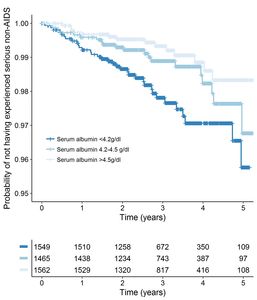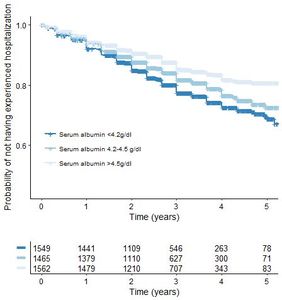Ronit, A;
Sharma, S;
Baker, JV;
Mngqibisa, R;
Delory, T;
Caldeira, L;
Ndembi, N;
... International Network for Strategic Initiatives in Global HIV Tr; + view all
(2018)
Serum Albumin as a Prognostic Marker for Serious Non-AIDS Endpoints in the Strategic Timing of Antiretroviral Treatment (START) Study.
The Journal of Infectious Diseases
, 217
(3)
pp. 405-412.
10.1093/infdis/jix350.

Preview |
Text
Phillips_Albumin_START_12.07.17_JID_revision1_clean.pdf - Accepted Version Download (533kB) | Preview |
Preview |
Text
Phillips_Online supplementary material 1_12.07_17.pdf - Accepted Version Download (246kB) | Preview |
![[thumbnail of Phillips_Fig1_JID_revision1.jpg]](https://discovery-pp.ucl.ac.uk/10042118/13.hassmallThumbnailVersion/Phillips_Fig1_JID_revision1.jpg)  Preview |
Image
Phillips_Fig1_JID_revision1.jpg - Accepted Version Download (189kB) | Preview |
![[thumbnail of Phillips_Fig2_tiff (002).jpg]](https://discovery-pp.ucl.ac.uk/10042118/18.hassmallThumbnailVersion/Phillips_Fig2_tiff%20%28002%29.jpg)  Preview |
Image
Phillips_Fig2_tiff (002).jpg - Accepted Version Download (25kB) | Preview |
Abstract
Background: Serum albumin may be used to stratify human immunodeficiency virus (HIV)-infected persons with high CD4 count according to their risk of serious non-AIDS endpoints. Methods: Cox proportional hazards models were used to analyze the risk of serious non-AIDS events in the Strategic Timing of Antiretroviral Treatment (START) study (NCT00867048) with serum albumin as a fixed and time-updated predictor. Models with exclusion of events during initial follow-up years were built to assess the ability of serum albumin to predict beyond shorter periods of time. Secondarily, we considered hospitalizations and AIDS events. Results: Among 4576 participants, 71 developed a serious non-AIDS event, 788 were hospitalized, and 63 experienced an AIDS event. After adjusting for a range of variables associated with hypoalbuminemia, higher baseline serum albumin (per 1 g/dL) was associated with a decreased risk of serious non-AIDS events (hazard ratio, 0.37 [95% confidence interval, .20-.71]; P = .002). Similar results were obtained in a time-updated model, after controlling for interleukin 6, and after excluding initial follow-up years. Serum albumin was independently associated with hospitalization but not with risk of AIDS. Conclusions: A low serum albumin level is a predictor for short- and long-term serious non-AIDS events, and may be a useful marker of risk of noncommunicable diseases, particularly in resource-limited settings.
| Type: | Article |
|---|---|
| Title: | Serum Albumin as a Prognostic Marker for Serious Non-AIDS Endpoints in the Strategic Timing of Antiretroviral Treatment (START) Study |
| Location: | United States |
| Open access status: | An open access version is available from UCL Discovery |
| DOI: | 10.1093/infdis/jix350 |
| Publisher version: | https://doi.org/10.1093/infdis/jix350 |
| Language: | English |
| Additional information: | This version is the author accepted manuscript. For information on re-use, please refer to the publisher’s terms and conditions. |
| Keywords: | HIV, albumin, biomarker, non-AIDS comorbidity, non-communicable disease |
| UCL classification: | UCL UCL > Provost and Vice Provost Offices > School of Life and Medical Sciences UCL > Provost and Vice Provost Offices > School of Life and Medical Sciences > Faculty of Population Health Sciences > Institute for Global Health UCL > Provost and Vice Provost Offices > School of Life and Medical Sciences > Faculty of Population Health Sciences > Institute for Global Health > Infection and Population Health |
| URI: | https://discovery-pp.ucl.ac.uk/id/eprint/10042118 |
Archive Staff Only
 |
View Item |


